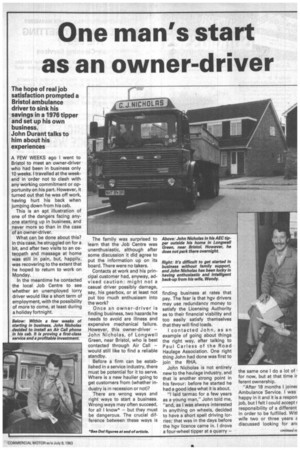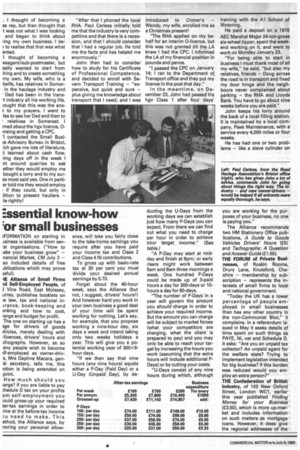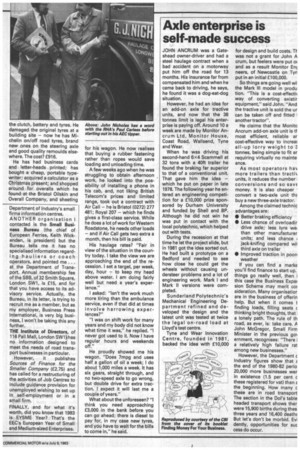One man's start as an owner-driver
Page 23

Page 24

Page 25

If you've noticed an error in this article please click here to report it so we can fix it.
The hope of real job satisfaction prompted a Bristol ambulance driver to sink his savings in a 1976 tipper and set up his own business.
John Durant talks to him about his experiences
A FEW WEEKS ago I went to Bristol to meet an owner-driver who had been in business only 10 weeks. I travelled at the weekend in order not to clash with any working commitment or opportunity on his part. However, it turned out that he was off work, having hurt his back when jumping down from his cab.
This is an apt illustration of one of the dangers facing anyone starting up in business, and never more so than in the case of an owner-driver.
What can be done about this? In this case, he struggled on for a bit, and after two visits to an osteopath and massage at home was still in pain, but, happily, was recovering to the extent that he hoped to return to work on Monday.
In the meantime he contacted the local Job Centre to see whether an unemployed lorry driver would like a short term of employment, with the possibility of more to come, at least during a holiday fortnight. . The family was surprised to learn that the Job Centre was unenthusiastic, although after some discussion it did agree to put the information up on its board. There were no takers.
Contacts at work and his principal customer had, anyway, advised caution: might not a casual driver possibly damage, say, his gearbox, or at least not put too much enthusiasm into the work?
Once an owner-driver is finding business, two hazards he needs to avoid are illness and expensive mechanical failure. However, this owner-driver — John Nicholas, of Longwell Green, near Bristol, who is best contacted through Air Call — would still like to find a reliable standby.
Before a firm can be established in a service industry, there must be potential for it to serve. Where is a new haulier going to get customers from (whether industry is in recession or not)?
There are wrong ways and right ways to start a business. Wrong ways may often succeed, for all I know* — but they must be dangerous. The crucial difference between these ways is finding business at rates that pay. The fear is that hgv drivers may use redundancy money to satisfy the Licensing Authority as to their financial viability and too easily satisfy themselves that they will find loads.
I contacted John, as an example of going about things the right way, after talking to Paul Carless of the Road Haulage Association. One right thing John had done was first to join the RHA.
John Nicholas is not entirely new to the haulage industry, and that is another strong point in his favour: before he started he had a good idea what it is about.
"I laid tarmac for a few years as a young man," John told me, "and, as I was always interested in anything on wheels, decided to have a short spell driving lorries; that was in the days before the hgv licence came in. I drove a four-wheel tipper at a quarry — the same one I do a lot of for now, but at that time ir ferent ownership.
"After 18 months I joine( Ambulance Service. I was happy in it and it is a respon job, but I felt I could accept r responsibility of a different in order to be fulfilled. Witt wife two or three years e discussed looking for an
. I thought of becoming a BS rep, but then thought that t was not what I was looking and began to think about ring my own business. I beto realise that that was what anted.
I thought of becoming a nrsagent/sub-postmaster, but eally wanted to start from hing and to create something my own. My wife, who is a iwife, has relatives in Somerin the haulage industry and • Dad has been in the trans/ industry all his working life. !ought that this was the ansr to my prayers. I went to les to see her Dad and then to relatives in Somerset. I rned about the hgv licence, 0:rising and getting a CPC.
'I contacted the Small Busk ;..s Advisory Bureau in Bristol, ich gave me lots of literature, learned about cash flow. ring days off in the week I nt around quarries to ask ether they would employ me bought a lorry and to my surse most said yes. One in partiar told me they would employ if they could, but only in Jition to present hauliers — te rightly! "After that I phoned the local RHA. Paul Carless initially told me that the industry is very cornpetitive and that there is a recession, and that I should consider that I had a regular job. He told me the facts and has helped me enormously."
John then had to consider how to study for his Certificate of Professional Competence, and decided to enroll with Severn Transport Training — "expensive, but quick and sure — plus giving me knowledge about transport that I need; and I was introduced to Croner's — Wendy, my wife, enrolled me as a Christmas present!
"The RHA applied on my behalf for an interim 0-licence, but this was not granted till the LA knew I had the CPC. I informed the LA of my financial position in pounds and pence.
"I passed the CPC on January 14; I ran to the Department of_ Transport office and they put my licence in the post that day."
In the meantime, on December 23, John had passed his hgv Class 1 after four days' training with the Al School of Motoring.
He paid a deposit on a 1976 AEC Marshal Major 24-ton-gross six-wheel tipper, spent the weekend working on it, and went to work on Monday January 23.
"For being able to start in business I must thank most of all my wife," he said, "but also my relatives, friends — Doug across the road is in transport and fixed my door hinge and the neighbours never complained about parking — the RHA and Lloyds Bank. You have to go about nine weeks before you are paid."
John keeps his lorry around the back of a local filling station. It is maintained by a local company, Fleet Maintenance, with a service every 4,000 miles or four weeks.
He has had one or two problems — like a slave cylinder on the clutch, battery and tyres. He damaged the original tyres at a building site — now he has Michelin on/off road tyres, brand new ones on the steering axle and good quality remoulds elsewhere. The cost? £916.
He has had business cards and letter-heads printed; has bought a cheap, portable typewriter; acquired a calculator as a Christmas present; and shopped around for overalls which he found at the Bristol Oilskin and Overall Company, and sheeting for his wagon. He now realises that buying a rubber fastening rather than ropes would save loading and unloading time.
A few weeks ago when he was struggling to obtain afternoon work, he looked into the possibility of installing a phone in his cab, and, not liking British Telecom's prices and limited range, took out a contract with Air Call — he is Bristol (0272) 277 481; Royal 207 — which he finds gives a first-class service. While he does a lot of work for Western Roadstone, he needs other loads — and if Air Call gets two extra a month, then his bill is paid.
His haulage rates? "Fair in view of the situation in the country today. I take the view we are approaching the end of the recession. I set a target, per week, day, hour — to keep my head above water. I am doing fairly well but need a year's experience."
I asked: "Isn't the work much more tiring than the ambulance service, even if that did at times involve harrowing experiences?"
"I was on shift work for many years and my body did not know what time it was," he replied. "I never got used to it. Now I have regular hours and weekends off."
He proudly showed me his wagon. "Does 7mpg and uses half a gallon of oil a week; I do about 1,000 miles a week. It has six gears, straight through, and no two-speed axle to go wrong, but double drive for extra traction. I expect it will last me a couple of years."
What about the unforeseen? "I think you need approaching £3,000 in the bank before you can go ahead; there is diesel to pay for, in my case new tyres, and you have to wait for the bills to come in," he said.




















































































